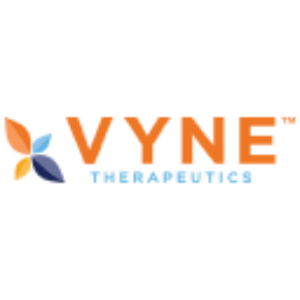VYNE Therapeutics Announces Phase 1b Data for FMX114 from Phase 1b/2a Trial for the Treatment of Mild-to-Moderate Atopic Dermatitis
Rhea-AI Summary
VYNE Therapeutics has completed the Phase 1b portion of its clinical trial for FMX114, a topical treatment for mild-to-moderate atopic dermatitis. The formulation combines tofacitinib and fingolimod, showing significantly lower systemic drug exposure compared to oral forms. The mean plasma Cmax of tofacitinib was reported as 50-fold and 1500-fold lower at Days 1 and 14, respectively. The study, initially set for 6 subjects, was amended to 4 due to early data. Encouraging results support progression to Phase 2a, with topline results expected in Q1 2022.
Positive
- Phase 1b trial results support the continuation of FMX114 development.
- Topical formulation shows significantly lower systemic exposure of tofacitinib compared to oral alternatives.
Negative
- The trial enrollment was reduced from 6 to 4 subjects based on initial findings, indicating potential limitations in data robustness.
- Pharmacokinetics for fingolimod were undetectable, raising concerns about its efficacy in the formulation.
News Market Reaction 1 Alert
On the day this news was published, VYNE declined 4.22%, reflecting a moderate negative market reaction.
Data tracked by StockTitan Argus on the day of publication.
Systemic bioavailability of JAK inhibitor (tofacitinib) and S1P receptor modulator (fingolimod) in topical formulation substantially lower compared to oral equivalents
Mean Cmax of tofacitinib 50-fold and 1500-fold lower at Day 1 and 14 of study compared to the lowest commercially available oral alternative
Findings from Phase 1b safety portion of study support trial continuation
Topline Phase 2a results expected in Q1 2022
BRIDGEWATER, N.J., Jan. 19, 2022 (GLOBE NEWSWIRE) -- VYNE Therapeutics Inc. (Nasdaq: VYNE) (“VYNE” or the “Company”) today announced that it has completed the Phase 1b portion of a Phase 1b/2a clinical trial evaluating FMX114 for the treatment of mild-to-moderate atopic dermatitis (AD) (Study VY2021-01). FMX114 is VYNE’s proprietary investigational combination gel formulation of tofacitinib and fingolimod. The product is being developed to address both the source and cause of inflammation in AD. FMX114 has the potential to be the first topical combination product for the treatment of AD as well as the first topical product in clinical development that utilizes the sphingosine 1-phosphate receptor modulation mode of action.
The objective of the Phase 1b portion of the study was to evaluate the preliminary clinical safety, dermal tolerance and pharmacokinetics of FMX114 and vehicle gels when topically applied for up to 2 weeks to individual qualifying atopic dermatitis lesions. The study planned to enroll up to 6 subjects with mild to moderate atopic dermatitis in this Phase 1b safety portion. However, based on the data obtained from the first two completing subjects, the Human Research Ethics Committee (HREC) in Australia overseeing the study agreed to reduce the enrollment number to 4 subjects with mild to moderate atopic dermatitis.
At the study baseline visit, each subject had two AD lesions of comparable severity and extent based on the Atopic Dermatitis Severity Index (ADSI) scoring assessment and qualifying lesions were randomized to either FMX114 or vehicle gel treatment. Adverse events, clinical laboratory results and local dermal tolerance data was collected throughout subject participation in the study. Pharmacokinetics of tofacitinib, fingolimod and fingolimod 1-phosphate were evaluated based on blood/plasma concentration data obtained from highly sensitive and validated bioanalytical methods.
Both FMX114 and vehicle gel treatments were generally well-tolerated, and no serious adverse events were recorded during study conduct. Pharmacokinetics of tofacitinib, fingolimod and fingolimod 1-phosphate are summarized below:
- The mean plasma Cmax of tofacitinib calculated on treatment day 1 and day 14 were approximately 50-fold and 1500-fold lower, respectively, when compared to the equivalent data for the lowest commercially available adult oral dose of tofacitinib (XELJANZ 5mg BD).1
- The mean plasma Cmax of tofacitinib was determined to be 0.914 ng/ml and 0.0220 ng/ml on treatment day 1 and 14 respectively (assay Lower Limit of Quantification [LLOQ]: 0.01ng/ml).
- Systemic drug accumulation of tofacitinib was negligible over the dosing period, with an accumulation ratio calculation based on Cmax of 0.03. In samples obtained one week after the end of treatment, tofacitinib was not quantifiable (<0.01ng/ml).
- The pharmacokinetics of fingolimod and active metabolite, fingolimod 1-phosphate could not be determined as all whole blood concentrations were below the assay LLOQ (0.08ng/ml for both analytes). The mean whole blood Cmax for fingolimod and fingolimod 1-phosphate for the adult oral dose of fingolimod (GILENYA 0.5mg QD) is 3.7ng/ml and 1.8ng/ml respectively at steady state.2
Dr. Iain Stuart, Chief Scientific Officer of VYNE, stated, “FMX114 was designed to deliver both active drugs efficiently to the skin while minimizing their respective systemic exposures. We are encouraged by the results from the Phase 1b portion of study VY2021-01 and look forward to announcing top-line Phase 2a results later this quarter.”
About Study VY2021-01 (ClinicalTrials.gov Identifier: NCT04927572)
The Phase 1b/2a study is a randomized, double-blinded trial designed to compare the safety and efficacy of FMX114 gel with vehicle gel. The study is expected to enroll up to 31 subjects, with each subject serving as their own control. The enrollment criteria specifies that subjects must have two comparable target AD lesions for treatment upon entry. Participants will have FMX114 gel applied to one of these lesions and vehicle gel to the other. Up to six subjects will be initially treated twice daily with FMX114 and vehicle for up to two weeks to evaluate preliminary safety of FMX114 and the pharmacokinetics of tofacitinib, fingolimod and fingolimod 1-phosphate. A further 25 subjects will receive FMX114, and vehicle treatment applied twice daily for four weeks in a double-blinded phase of the study to further evaluate safety, pharmacokinetics and efficacy. After completion of this phase, these subjects may continue into a two-week open-label treatment phase and will be able to apply the active drug to both lesions. The trial is being conducted in Australia in subjects with mild-to-moderate atopic dermatitis (clinicaltrials.gov link) in two segments:
- XELJANZ/XELJANZ XR/XELJANZ Oral Solution US Prescription Information, December 2021
- Clinical Pharmacokinetics of Fingolimod, Clin Pharmacokinet 2012;51(1):15-28]
About FMX114
FMX114 is VYNE’s proprietary investigational combination gel formulation of tofacitinib and fingolimod. The product is being developed to address both the source and cause of inflammation in AD by developing a distinct combination of tofacitinib (a Janus kinase inhibitor) aimed at reducing inflammation by inhibiting cytokine release from inflammatory cells) and fingolimod (a Sphingosine 1-phosphate receptor modulator) which approaches the reduction of inflammation by inhibiting migration of inflammatory cells, and in addition may also directly support skin barrier recovery. FMX114 has the potential to be the first topical combination product for the treatment of AD as well as the first topical product in clinical development that utilizes the sphingosine 1-phosphate receptor modulation mode of action.
About Atopic Dermatitis
Atopic dermatitis (AD) is a chronic, severe form of eczema that is characterized by the appearance of dry, red, and itchy skin. AD most commonly affects the cheeks, arms, and legs. Flare ups often occur and symptoms can worsen leading to more-intense itching and worsening of disease. AD flares are triggered by stress, temperature changes, sweat, various skin irritants, and allergies. AD can have a wide-ranging impact on quality of life and there is a substantial monetary burden from direct and indirect costs to this patient population. While AD occurs most often in childhood, it can develop at any point in a person’s lifetime and affects approximately 30 million people in the U.S. alone. Approximately 22 million of those diagnosed are on treatment, with 19 million registering mild to moderate disease. According to Symphony Health data, there were over 7 million prescriptions written in 2019 alone for the treatment of AD.
About VYNE Therapeutics Inc.
VYNE’s mission is to improve the lives of patients by developing proprietary, innovative, and differentiated therapies for the treatment of immuno-inflammatory conditions. The Company’s unique and proprietary pipeline includes FMX114 for the potential treatment of mild-to-moderate atopic dermatitis and access to a library of bromodomain & extra-terminal (BET) domain inhibitors in both topical and oral forms for the potential treatment of major immuno-inflammatory conditions and rare skin diseases.
For more information about VYNE Therapeutics Inc. or its investigational products, visit www.vynetherapeutics.com. VYNE may use its website to comply with its disclosure obligations under Regulation FD. Therefore, investors should monitor VYNE’s website in addition to following its press releases, filings with the U.S. Securities and Exchange Commission, public conference calls, and webcasts.
Investor Relations:
John Fraunces
LifeSci Advisors, LLC
917-355-2395
jfraunces@lifesciadvisors.com
Tyler Zeronda
VYNE Therapeutics Inc.
908-458-9106
Tyler.Zeronda@VYNEtx.com
Cautionary Statement Regarding Forward-Looking Statements
This release includes forward-looking statements within the meaning of the Private Securities Litigation Reform Act of 1995, including, but not limited to, statements regarding the development and commercialization of VYNE’s product candidate, FMX114, and other statements regarding the future expectations, plans and prospects of VYNE. All statements in this press release which are not historical facts are forward-looking statements. Any forward-looking statements are based on VYNE’s current knowledge and its present beliefs and expectations regarding possible future events and are subject to risks, uncertainties and assumptions that could cause actual results to differ materially and adversely from those set forth or implied by such forward-looking statements. These risks and uncertainties include, but are not limited to: the outcome and cost of preclinical and clinical trials for current and future product candidates; determination by the FDA that results from VYNE’s preclinical and clinical trials are not sufficient to support registration or marketing approval of product candidates; adverse events associated with the development and commercialization of FMX114 and VYNE’s other product candidates; the COVID-19 pandemic and its impact on our business operations and liquidity, including our ability to progress a preclinical or clinical trial; the size of the atopic dermatitis market; the potential patient base and commercial potential of FMX114 or any of VYNE’s other product candidates; risks of potential litigation by third-parties regarding infringement of third-party intellectual property; risks that VYNE’s intellectual property rights, such as patents, may fail to provide adequate protection, may be challenged and one or more claims may be revoked or interpreted narrowly or will not be infringed; risks that any of VYNE’s patents may be held to be narrowed, invalid or unenforceable or one or more of VYNE’s patent applications may not be granted and potential competitors may also seek to design around VYNE’s granted patents or patent applications; additional competition in the markets in which we compete; inability to raise additional capital on favorable terms or at all; VYNE’s ability to recruit and retain key employees; and VYNE’s ability to stay in compliance with applicable laws, rules and regulations. For a discussion of other risks and uncertainties, and other important factors, any of which could cause VYNE’s actual results to differ from those contained in the forward-looking statements, see the section titled “Risk Factors” in VYNE’s Annual Report on Form 10-K for the year ended December 31, 2020, as well as discussions of potential risks, uncertainties, and other important factors in VYNE’s subsequent filings with the U.S. Securities and Exchange Commission. Although VYNE believes these forward-looking statements are reasonable, they speak only as of the date of this announcement and VYNE undertakes no obligation to update publicly such forward-looking statements to reflect subsequent events or circumstances, except as otherwise required by law. Given these risks and uncertainties, you should not rely upon forward-looking statements as predictions of future events.









